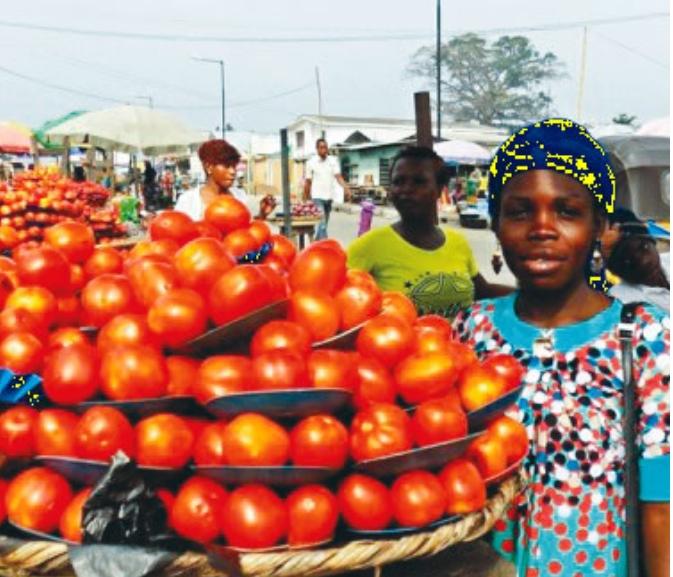Business
Housewives Lament As Tomato Prices Soar
Published
10 months agoon
By
Editor
Some housewives in the Federal Capital Territory, Abuja on Sunday said they have ditched tomatoes for their stews and other sauces as cost skyrockets.
The residents, who made this known in an interview with the News Agency of Nigeria, said they have resorted to using garden eggplants and carrots in their stews.
They said garden egg, called “ganyen gauta” in Hausa, “igba” in Yoruba, and “anyara” in Igbo, could blend very well with rice in the same manner as tomatoes.
Others said they were exploring pumpkin, pawpaw, or traditional soups like white soup and palm fruit soup popularly called banga soup in place of tomato stew.
READ ALSO: Pilot Killed As Fighter Jet Crashes During Venezuela Exercise
Mrs Jumai Amodu, a mother of five, said a week without rice with tomato stew was unfulfilling for her and the family.
She said rice with stew was a regular on their menu, adding that “there is an unexplainable satisfaction that comes with taking cooked rice and stew.”
The mother of five, however, said with the scarcity and high cost of tomatoes, her family was exploring garden egg stew.
Amodu said, “Since tomatoes became very expensive, we decided to use garden egg for stew and it is as sweet as tomato stew.
“The only major difference between garden egg stew and tomato stew is the colour.
READ ALSO: China Visits Nigeria With 3 Ships, Strengthens Bilateral Relationship
“We also use pumpkin stew with rice sometimes and although it has its unique taste, it blends well with rice.”
Mrs Helen Omo, a businesswoman, said although tomato stew was an important recipe in almost all homes in Nigeria, its scarcity had made some Nigerians think of alternatives.
“I went to the market yesterday to get some tomatoes for stew and a sizeable bushel, which costs between N2000 and N2500 was being sold for as much as N6500.
“I did not bother to haggle the price because it was way beyond my budget,” she said.
Mr Chinedu, an entrepreneur, told NAN that he enjoyed taking rice with pepper soup or white soup.
“The prices of all foodstuff have gone up but that of tomatoes is outrageous probably because it is tomatoes off-season.
READ ALSO: Soludo’s Call For Relocation Of Investment To Anambra Stirs Controversy
“Besides being expensive, it is very scarce and as a result, we decided to explore other recipes,” he said.
Umar Adamu, a tomatoes retailer in Nyanya market in the FCT, said he had stopped retailing tomatoes for some days due to low patronage.
He said customers were not “patronising him because of the high cost.”
Mrs Rukkaya Umar, Chief Executive Officer, Abraks Farm Produce Nigeria Limited said the primary reason for the scarcity of tomatoes was the high cost of fertiliser.
According to her, many tomato farmers do not grow it because they cannot afford fertiliser, adding that fertiliser was critical to its growth.
Umar also said reliance on seasonal farming was one of the reasons for the scarcity, adding that it was tomatoes off-season.
“Most farmers in Nigeria still do seasonal farming and that is contributing greatly to scarcity of farm produce particularly in their off-seasons,” she said.
NAN reports that a sizeable basket of tomatoes which hitherto sold for about N10,000 now sells for about N35,000 while big baskets cost more.
NAN
You may like


JUST IN: Nigeria’s Inflation Hit 31.70% In February – NBS


JUST IN: Nigeria Inflation Climbs To 26.72%


Naira Depreciation, Subsidy Removal Push Inflation To 22.79%


Inflation Rose 67 Times Under Emefiele, Says Report


Inflation Hits 18yr High at 22.4%, To Surpass 23% This Month


Nigeria’s Inflation Increases To 22.22 Per Cent

The Central Bank of Nigeria (CBN) started fresh and direct sales of US dollars at N1,021 per dollar to Bureau De Change operators.
Nigeria’s apex bank disclosed this in a circular signed by its Director of Trade and Exchange Department Hassan Mahmud.
“We write to inform you of the sale of $10,000 by the Central Bank of Nigeria (CBN) to BDCs at the rate of N1,021/$1. The BDCs are in turn to sell to eligible end users at a spread of NOT MORE THAN 1.5 percent above the purchase price,” the circular posted on its website read.
READ ALSO: Tinubu Unveils African Counter-Terrorism Summit
“ALL eligible BDCs are therefore directed to commence payment of the Naira deposit to the underlisted CBN Naira Deposit Account Numbers from today, Monday, April 22, 2024, and submit confirmation of payment, with other necessary documentations, for disbursement of FX at the respective CBN Branches.”
CBN’s move is coming as the naira is recording a slight depreciation against the dollar after weeks of gains.
In late March, the bank also sold $10,000 to each of the eligible Bureau De Change (BDC) operators in the country at the rate of N1,251/$1.
READ ALSO: Mixed Reactions Trail Video Of Couple’s Customised N200 Notes
Like in the most recent sales, it warned BDCs against breaching terms of the dollar sales, vowing to sanction defaulters “including outright suspension from further participation in the sale”.
The fortunes of the naira have fallen sharply since President Bola Tinubu took over in May. Inflation figures have reached new highs and the cost of living hitting the rooftops.
Nigeria’s currency slid to about N1,900/$ some months ago at the parallel market. But in recent weeks, it has gained against the dollar.
The Nigerian authorities have also doubled down on their crackdown against cryptocurrency platform Binance and illegal BDCs.
On March 1, the CBN revoked the licences of 4,173 BDCs over compliance failures.

Olusegun Alebiosu has been appointed as the Acting Managing Director/Chief Executive Officer of First Bank of Nigeria Limited (FirstBank Group), effective April 2024.
Alebiosu steps into this pivotal role from his previous position as the Executive Director, Chief Risk Officer, and Executive Compliance Officer, a position he held since January 2022.
Alebiosu brings to the helm of FirstBank over 28 years of extensive experience in the banking and financial services industry. His expertise spans various domains including credit risk management, financial planning and control, corporate and commercial banking, agriculture financing, oil and gas, transportation, and project financing.
READ ALSO: JUST IN: Access Holdings Names New Acting CEO
Having embarked on his professional journey in 1991 with Oceanic Bank Plc. (now EcoBank Plc.), Alebiosu has held several notable positions in esteemed financial institutions.
Prior to joining FirstBank in 2016, he served as Chief Risk Officer at Coronation Merchant Bank Limited, Chief Credit Risk Officer at the African Development Bank Group, and Group Head of Credit Policy & Deputy Chief Credit Risk Officer at United Bank for Africa Plc.
Alebiosu’s academic credentials further enrich his professional profile. He is an alumnus of the Harvard School of Government and holds a Bachelor’s degree in Industrial Relations and Personnel Management. Additionally, he obtained a Master’s degree in International Law and Diplomacy from the University of Lagos, as well as a Master’s degree in Development Studies from the London School of Economics and Political Science.
READ ALSO: Meet Newly Appointed Union Bank CEO
A distinguished member of various professional bodies, including the Institute of Chartered Accountants (FCA), Nigeria Institute of Management (ANIM), and Chartered Institute of Bankers of Nigeria (CIBN), Alebiosu is renowned for his commitment to excellence and ethical practices in the banking sector.
Beyond his professional endeavors, Alebiosu is known for his passion for golf and adventure. He is happily married and a proud parent.
With Alebiosu’s appointment, FirstBank of Nigeria Limited anticipates continued growth and innovation under his leadership, reinforcing its position as a leading financial institution in Nigeria and beyond.
Business
CBN Gives New Directive On Lending In Real Estate
Published
2 weeks agoon
April 17, 2024By
Editor
The Central Bank of Nigeria, CBN, has released a new regulatory directive to enhance lending to the real sector of the Nigerian economy.
The directive, issued on April 17, 2024, with reference number BSD/DIR/PUB/LAB/017/005 and signed by the Acting Director of Banking Supervision, Adetona Adedeji, signifies a notable shift in the bank’s policy towards a more contractionary approach.
In line with the new measures, the CBN has reduced the loan-to-deposit ratio by 15 percentage points, down to 50 per cent.
This move aligns with the CBN’s current monetary tightening policies and reflects the increase in the Cash Reserve ratio rate for banks.
READ ALSO: JUST IN: CBN Gov Sacks Eight Directors, 32 Others
The LDR is a metric used to evaluate a bank’s liquidity by comparing its total loans to its total deposits over the same period, expressed as a percentage.
An excessively high ratio may indicate insufficient liquidity to meet unexpected fund requirements.
All Deposit Money Banks are now mandated to adhere to this revised LDR.
The CBN has stated that average daily figures will be utilised to gauge compliance with this directive.
Furthermore, while DMBs are encouraged to maintain robust risk management practices in their lending activities, the CBN has committed to continuous monitoring of adherence and will adjust the LDR as necessary based on market developments.
READ ALSO: JUST IN: CBN Increases Interest Rate To 24.75%
Adedeji has called on all banks to acknowledge these modifications and adjust their operations accordingly. He emphasised that this regulatory adjustment is anticipated to significantly influence the banking sector and the wider Nigerian economy.
The circular read in part, “Following a shift in the Bank’s policy stance towards a more contractionary approach, it is crucial to revise the loan-to-deposit ratio policy to conform with the CBN’s ongoing monetary tightening.
“Consequently, the CBN has decided to decrease the LDR by 15 percentage points to 50 per cent, proportionate to the rise in the CRR rate for banks.
“All DMBs must maintain this level, and it is advised that average daily figures will still be applied for compliance assessment.
“While DMBs are urged to sustain strong risk management practices concerning their lending operations, the CBN will persist in monitoring compliance, reviewing market developments, and making necessary adjustments to the LDR. Please be guided accordingly.”

GMOs: HOMEF Trains Gelegele Farmers, Urges Them To Embrace Agroecology

[JUST IN] Akpata: UNIBEN Suspends Students’ Union

Ooni: Suspended Benin Palace Functionaries Banished
Trending

 News4 days ago
News4 days agoEdo: FRSC Threatens Sanction On Truck Drivers Loading Goods, Passengers Together

 Headline4 days ago
Headline4 days agoSaudi Arabia Opens First Alcohol Store, Nigerian Muslims React

 Headline4 days ago
Headline4 days agoVIDEO: Meet Nigerian Pastor Who Predicted World Will End April 25

 News4 days ago
News4 days ago243 Passengers Cheat Death As Air Peace Plane Makes Emergency Landing At Lagos Airport

 Metro5 days ago
Metro5 days agoJUST IN: Four-year-old Boy Dies In Abuja School, Parents Suspect Foul Play

 Metro5 days ago
Metro5 days agoJUST IN: Protesters Storm APC Secretariat, Demand Ganduje’s Resignation

 News4 days ago
News4 days agoDSTV Price Hike: Five Alternatives Nigerians Are Opting For

 Politics4 days ago
Politics4 days agoEdo Guber: PDP Unveils 200-member Campaign Council

 News5 days ago
News5 days agoEFCC Withdraws Appeal Against Former Kogi Gov, Bello

 News4 days ago
News4 days agoJUST IN: Senator Ayogu Eze Is Dead




























